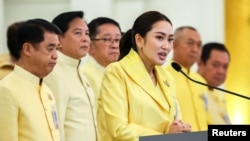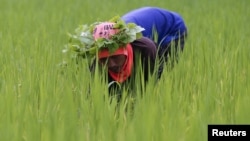Rural voters may have permanently turned away from the Shinawatra family and its Pheu Thai party, former loyalists warn, after Thailand’s dominant political clan welcomed a fresh cohort of conservative one-time rivals into its coalition Cabinet.
These include prominent royalists who have backed coups and deadly crackdowns on the Red Shirt protest movement, which emerged to protest a 2006 coup that deposed then-Prime Minister Thaksin Shinawatra.
Tycoons and royalist generals have fought for two decades for control of the country’s politics and the economic spoils.
In that time, political violence has claimed the lives of scores, if not hundreds, of people in clashes between rival factions. Red Shirts paid the highest price during a 2010 army crackdown on their rallies in Bangkok.
Rivalry at the top has been set aside — for now — by a government led by Paetongtarn Shinawatra, the daughter of divisive billionaire Thaksin Shinawatra, who still wields vast influence over Thai politics despite having no formal role.
Now, many Red Shirts say they feel abandoned by Thaksin, a figurehead they once adored.
“I used to feel sorry for Thaksin for all the things the establishment did to him and his family. But now that they’ve betrayed us, I’m heartsick,” said Napassorn Boonree, 61, a Red Shirt from Ubon Ratchathani, recalling the 2010 crackdown by security forces on demonstrators in Bangkok. “People died for [the Shinawatra family], but they no longer care for us. Now we see their true colors. They’ve done everything all along only for their own gain.”
Paetongtarn Shinawatra’s government has a new mission: to defeat the new reform movement which won the last polls in 2023 and has become the biggest threat to the political and economic interests of the establishment since Thaksin himself won his first election in 2001.
The Move Forward Party was blocked from taking control of the government and subsequently dissolved by a court ruling. Its key executives were banned from politics.
But it has been rebranded as the People’s Party and is determined to win the 2027 election.
Too late for Pheu Thai?
Thaksin’s daughter, Thailand’s youngest premier at age 38, is due to give her first policy briefing on September 12.
She is expected to announce a timeframe for cash handouts of 10,00 baht ($295) to 50 million citizens alongside debt-reduction plans, hoping to renew faith in Pheu Thai among a poor, rural base who once voted unquestioningly for any Shinawatra candidate.
But it may be too late.
Red Shirts “will express their disappointment at the ballot box,” predicted Thida Thavornseth on Thai TV, describing the “merger” between Pheu Thai and its former enemies as the same as a business deal between tycoons.
In any case, Paetongtarn’s government first must survive to contest the next polls.
Coming into office after the shock court dismissal of predecessor Srettha Thavisin in an ethics probe last month, Paetongtarn will have to deal with powerful establishment enemies accumulated by her family over the years.
“Having Shinawatra as a last name is always a danger. ... The name is synonymous with political conflict in modern Thai history,” said Stithorn Thananithichot, director of the Office of Innovation for Democracy at King Prajadhipok's Institute.
Thaksin was deposed in a 2006 coup, and the administration of his sister Yingluck was taken out by the army in 2014. Srettha last month joined a growing list of Shinawatra-backed premiers to be picked off by the conservative courts.
“We are seeing enemies becoming allies against a bigger threat — [the] People’s Party. The conservative elite has no other option than to use Thaksin’s service,” Stithorn told VOA.
But Paetongtarn has “to move fast,” he warned, to prove her government can win over an electorate burned by the seeming betrayal of their shifting alliances.
A by-election on September 15 for a seat vacated by a banned Move Forward member may provide an early test of Pheu Thai’s popularity.
Money problems
Throughout villages of northeastern and northern Thailand, household debt is commonly sky high, and many working-age adults have migrated to cities or overseas for jobs that pay more than farm work. The COVID pandemic sank Thailand’s most vulnerable deeper into financial trouble.
Previous Shinawatra governments gave generous farm subsidies, better education and access to basic healthcare and were rewarded with landslide poll victories in 2001, 2005 and 2011.
Former Red Shirt Singthong Chaichuay says he is so tired of Thailand’s political turmoil that principles no longer matter. He just wants a better quality of life for the country’s poorest.
“Thai people are very forgiving, and if our country is really moving forward, then I don’t have a problem which side Pheu Thai joins, even if it is with former enemies,” the 61-year-old told VOA from his village in Surin, near the Cambodian border.
“Whoever can make our lives better is the answer for us now.”
But there is a divergence with younger people. In the 2023 election, they voted in vast numbers for Move Forward, taking seats from Pheu Thai across what was once home ground for Shinawatra-linked lawmakers.
“During Thaksin times, it was the golden era for farmers. Everyone was driving new tractors, the price of rice was also high,” said Chatupat Sriwong, 31, who like many of her peers leaves her young child to be raised at home while working abroad.
“Fast forward to today … and we’re developing very little here. My only focus now is to make money and that means working overseas because there’s no way I can do that here.”


